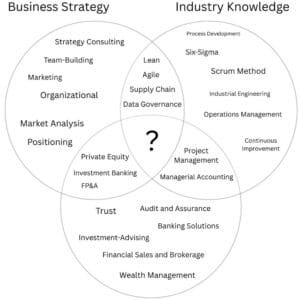Common disconnects with specialists and business owners – and how to overcome them
By Roman Raies, Market Analyst
Thinking about advising? Here’s how to get started
When it comes to advice on how to run your business profitably, it can be hard to sift through all the noise. It may seem like there is an overwhelming amount of choice or that many firms do the exact same thing. You have industry consultants, business coaches, financial advisors, CPAs, and data managers. As a business owner, you’ll find that advisors who specialize in one field tend to be highly competent in what they do, though they may miss things you catch from your perspective as owner.

So, what kind of advisor do you need?
It is likely you have thought about advising based on the business you run and the challenges you want to address. However, the type of advisor you choose also reflects the urgency of your needs and whether your challenges can be addressed with a quick fix or require a longer-term advising partnership. For example, marketing agencies often quickly boost inbound leads but might not help with longer-term issues of consumer satisfaction.
- Do the limitations of your physical operations impact how you market, prospect and negotiate
- Look at both strategy and physical operations together for better insights.
- If quick fixes are tempting…
- …consider that longer-term partners may accomplish more in terms of driving durable success and lasting profitability.
- If your earnings are not what you expect…
- …consider whether long-term financial needs can be resolved by improving the business itself or require stronger financial planning.
What makes advising effective?
Specialists who advise business owners sometimes fall victim to tunnel vision. Information siloing has the effect of overvaluing what we know and undervalue what we do not know. Rory Sutherland, Vice Chairman of Ogilvy UK, behavioral economics advocate, puts it in a different way:
“The opposite of a good idea can also be a good idea. But overspecialization means you’re trained to dismiss things that don’t fit the model you know.”
While an individual business advisor is often highly specialized, a well-rounded team of advisors helps avoid the pitfall Sutherland mentions. This is why firms like Cogent Analytics have worked successfully to grow companies where sole-focus or cookie-cutter advisors have struggled.
Common information silo pitfalls
- Good solutions that do not help firm realize full potential
- Example: CPA creates a tax savings strategy but not a roadmap for successful reinvestment into new growth.
- Example: Misalignment between marketing and sales generates leads, but not qualified leads.
- Operational competence disconnected from strategy
- Few firms work with clients to tie together physical process efficiency with long-term profit and loss.
- Focus on industry knowledge must be accompanied by a strategy to meet profitable demand.
- Example: Improving inventory turnover for items that will have less demand in the future – this increases operational strength with limited impact on profit.
- Prioritizing creativity OR expertise at the expense of the other
- Unwillingness to explore other approaches.
- Overinvestment in “same old solutions” when industry or market is changing.
Think of your business challenges as a health issue that is tough to beat. There may be one treatment that addresses certain symptoms but still leaves the patient feeling sick. This is because the root cause is often not black and white. Business issues spiral, feeding into each other, leading to a cycle of tunnel vision and disappointment when specialized advice still leaves a business struggling.
How to bridge the gaps between silos
When advisors work in isolation, failure happens. A better approach is holistic, integrated advisory services. Cogent invariably uncovers crucial information trapped in silos by working holistically. This means:
- Tailored financial, marketing, and operational approaches for industry and market position.
- Reframing specialist advice into the broader context of your goals, not just a narrow slice.
- Workflows that allow information to flow horizontally, not just top-down to you.
- Outcome-focused strategies over discipline-specific wins.
What performance results should advising achieve?
It is easy for information silos to form unintentionally as departments become accustomed to their own routines. Even at small companies, it is worth evaluating how to break down silos. You will find both immediate and long-term benefits to removing silos.
Area | Immediate | Long-Term |
Financial | Lower tax burdens. | Better financial strategy and reinvestment into business |
Industrial / Innovative | Removal of outdated and inefficient processes – more work gets done | Structured improvements to industrial processes better product quality / work results |
Marketing sales alignment | Better conversion rates | Customer experience – more consistent experience – higher trust |
Organizational | Resources allocated to where it is most needed | Managerial effectiveness – you work on preventing problems not reacting to them |
Ultimately, successful advising doesn’t just mean solving isolated problems — it means uncovering how those problems connect and implementing holistic solutions across your business. When insight flows freely between operations, finance, marketing, and leadership, you’re in a far better position to make confident decisions and sustain growth.



